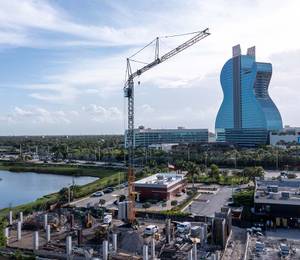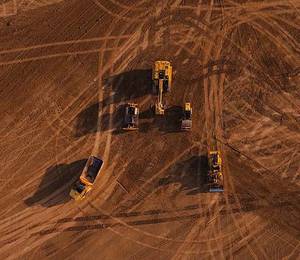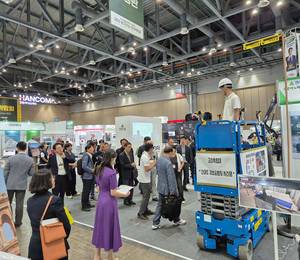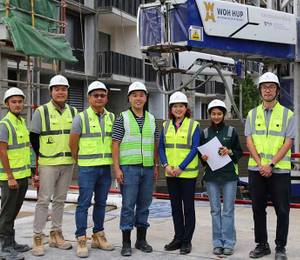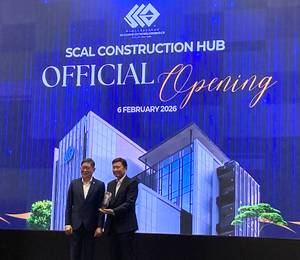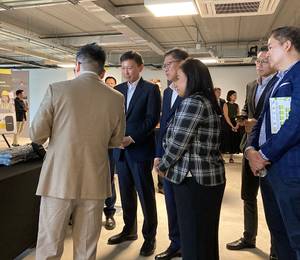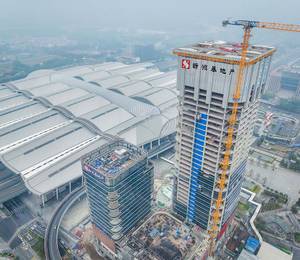Japan’s Obayashi Corporation has established its overseas R&D base in Singapore for the Asian region. This new facility, Obayashi Construction-Tech Lab Singapore (OCLS), was officially launched on 18 July 2024.
OCLS will serve as a hub for fostering and deploying next-generation construction productivity technologies in the Asian region, as well as for strengthening Obayashi’s research and development efforts through proactive collaboration with internal and external stakeholders.
Obayashi has been actively engaged in research and technology development both domestically and internationally. Among these efforts is the launch of its Asia Digital Lab project team in 2022, also in Singapore, to gather information on the latest construction technologies in the Asian region.
In Singapore, labour-saving and productivity improvement have become major social issues in the construction industry, triggered in part by the shortage of foreign workers due to the pandemic, Obayashi explained. Construction companies and start-ups in Singapore and abroad are actively developing technologies and applying them to construction sites.
To that end, Obayashi has set up OCLS as a base for joint research and development with universities and other research institutions, construction companies, and start-ups in Asia. The focus will be on construction robotics technology, which is being actively developed and applied in the Asian region, and supporting its application to construction sites in Asia. In the future, OCLS will expand its scope to fields beyond construction robotics, actively promote the results of its research and development outside Japan, and promote the spread of its technology.
With OCLS as a starting point, Obayashi aims to solve social issues on a global scale by building a research and development ecosystem in Singapore and the rest of Asia, and accelerating the development of future-oriented technologies that transcend the boundaries of the construction industry.
OCLS offices are located at Building and Construction Authority’s (BCA) Braddell Campus, making them part of the Built Environments Innovation Hub (BEIH) ecosystem. Launched in October 2023, BEIH is envisioned as a collaborative space for like-minded individuals to connect and showcase innovative technologies, exchange ideas, and transfer knowledge to accelerate the transformation of the built environment.
“I look forward to OCLS’s upcoming collaborations with ecosystem partners including our local research institutions, and the impact they could create by working together to drive the development and adoption of advanced innovations in the built environment sector,” said Kelvin Wong, CEO of BCA.
R&D initiatives at OCLS
OCLS will receive funding support from BCA’s Productivity Innovation Project (PIP) incentive scheme to bring robots from Chinese robot maker Fang Shi Technology to Singapore. This PIP scheme co-funds technology adoption and innovations that improve productivity. Fang Shi’s concrete levelling and troweling robots will be used in one of Obayashi Singapore’s ongoing projects, aiming to greatly reduce the manual labour required compared to existing methods.
OCLS will also collaborate with the Singapore Centre for 3D Printing (SC3DP), located within Nanyang Technological University (NTU), to explore the application of 3D printing technology in the construction industry. Under the new master research collaboration agreement (MRCA), OCLS and NTU Singapore will launch a joint laboratory at SC3DP. This partnership will focus on developing research initiatives that will pioneer the development of sustainable construction materials and the 3D printing of mechanical joints and multi-material components.
“NTU’s partnership with Obayashi represents a significant step forward in leveraging cutting-edge 3D printing technology and NTU’s deep expertise in additive manufacturing and engineering, to develop innovative solutions for industrial applications and to address critical challenges in construction, such as manpower constraints, productivity and sustainability,” said Professor Lam Khin Yong, vice president (industry) of NTU Singapore and the signatory for the MRCA.
In addition, following the memorandum of understanding (MOU) that OCLS and Singapore University of Technology and Design (SUTD) signed last November, both parties plan to conduct joint research and explore collaborations in the areas of design, development and application of robotic solutions as well as artificial intelligence (AI) to enhance the design and construction process. For example, SUTD and OCLS will be mapping construction sites using sensors and AI to explore ways to make them robot-friendly. Another area of collaboration is the development of a platform or framework enabling the remote management of multiple robots on different construction sites.
“SUTD is looking forward to working closely with Obayashi and sharing our expertise in design, AI and tech to augment the work that it is doing in the construction industry. Deploying robotics solutions onto construction sites is challenging, as there is no clear framework on how they can be integrated safely and efficiently on site,” explained Professor Chong Tow Chong, president of SUTD.
“By harnessing AI and creating a framework that enables seamless robotics integration, the deployment of robotics solutions on construction site could be a game changer. The development of a platform for remote robot management will also further revolutionise the industry, enhancing real-time monitoring and optimising resources for better outcomes.”
All images: Obayashi
